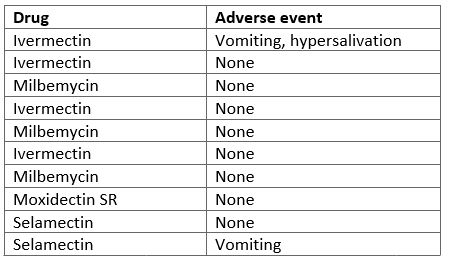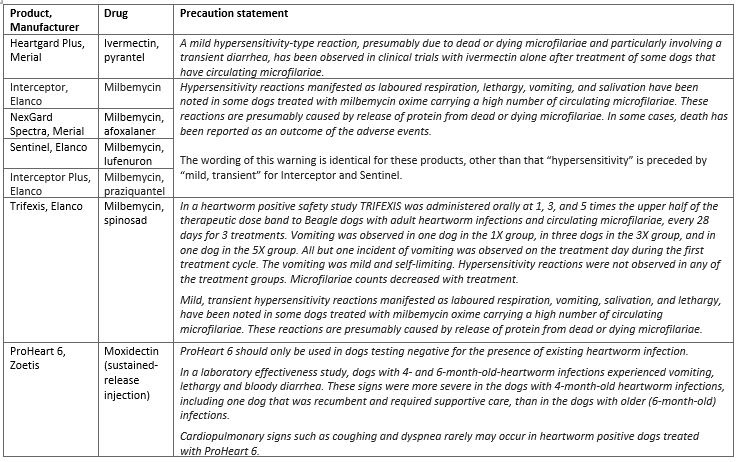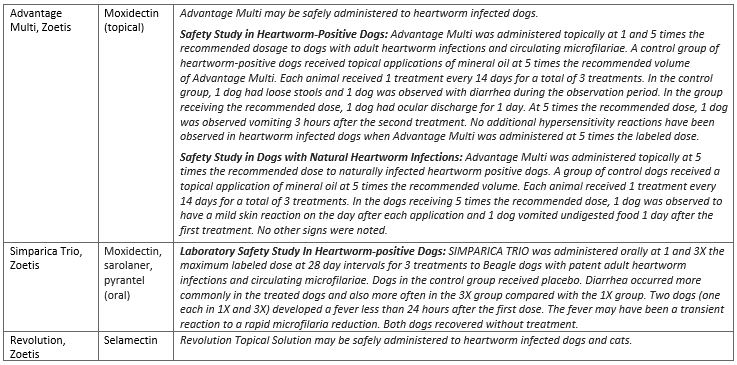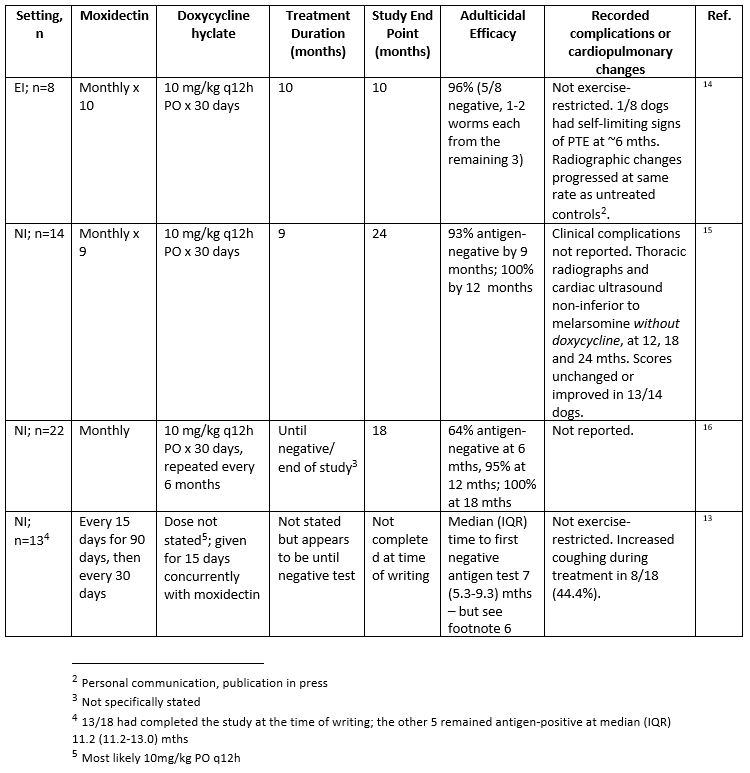Even in high-prevalence areas, annual heartworm testing is unlikely to fit criteria for urgent veterinary services during the COVID-19 pandemic, and social distancing between veterinary staff can rarely be maintained during a blood draw.
Treatment of heartworm-positive dogs is essential and life-saving – yet melarsomine treatment during the pandemic presents ethical difficulties. Dogs that are stable enough to receive melarsomine are not urgent or emergency cases, and social distancing between veterinary staff cannot be maintained during treatment. Veterinarians may elect to delay treatment until restrictions have been eased. Melarsomine is currently unavailable in Canada.
When testing and melarsomine treatment are temporarily unavailable, interim measures need to be in place to prevent new infections and stop existing infections from progressing. The American Heartworm Society (AHS) has published interim recommendations for veterinarians1. The Ontario Veterinary College has provided recommendations for heartworm testing and prevention that are more specific to Canada, where heartworm risk is generally low2.
Safety and Efficacy of Heartworm Preventives in Positive and Microfilaremic Dogs
In current circumstances, veterinarians face the decision of whether or not to prescribe heartworm preventives in dogs that have not been tested. This is extra-label product use and is contrary to standard recommendations. The concerns centre around dogs that are currently infected but undiagnosed: Owners may develop a false sense of security and may not present the dog for testing when it is available again; and microfilaremic dogs may have adverse reactions to preventives. Further, administration of macrocyclic lactones to positive dogs can result in false-negative antigen test results3,4. If preventives are given to untested dogs in high-risk areas, heat treatment of samples can unmask false negatives when testing becomes available again5.
The AHS interim recommendations suggest basing decisions on whether or not preventives have been given regularly, and on the duration of any lapse in prevention1. Mosquito repellants are recommended to prevent dogs that might be microfilaremic from being a source of infection to other dogs.

The safety and efficacy of heartworm preventives in microfilaremic dogs has been reviewed6. Table 1 summarizes safety studies and label precaution statements. Despite the potential for severe adverse reactions in rare cases, all macrocyclic lactones labelled for use as heartworm preventives are considered to be relatively safe for use in microfilaremic dogs, at the prescribed dose and under veterinary supervision6. Selamectin (Revolution®, Zoetis) and topical moxidectin (Advantage Multi®, Bayer) are labelled as safe for heartworm-positive dogs in Canada (Table 1B).
Further, administration of a macrocyclic lactone preventive is actively recommended, together with doxycycline, in heartworm-positive dogs prior to administration of melarsomine on day 60 post-diagnosis7. Topical moxidectin (Advantage Multi®) is approved by the FDA for use in dogs with microfilaremia8. Veterinarians should nonetheless communicate to clients that the use of preventives without testing is extra-label. The CVO Practice Advice document about waivers is here.
Veterinarians should have a good understanding of the potential risks of prescribing preventives other than those labelled as being safe (Table 1B), and must communicate this information clearly to clients.
Efficacy against microfilariae and microfilarial clearance times vary between products, and microfilariae will not be cleared in all dogs without adulticide treatment6. However, moxidectin is directly microfilaricidal and microfilariae are typically rapidly cleared by topical treatment with Advantage Multi9–11. In the non-arsenical treatment protocol, doxycycline and macrocyclic lactones act synergistically against microfilariae and immature worms6,12.
Moxidectin-Doxycycline (“Moxi-Doxy”)
Melarsomine is the only drug approved for use against adult heartworms and is the only treatment recommended by the American Heartworm Society7. However, for dogs previously identified as positive, veterinarians can consider using extra-label non-arsenical alternatives during the pandemic.

Current evidence indicates that moxi-doxy is the most effective non-arsenical treatment combination8–11, with good results for topical monthly 10% imidacloprid+2.5% moxidectin (Advantage Multi®) combined with doxycycline 10mg/kg q12h for 28-30 days9–11.
Under normal circumstances, non-arsenical treatment is only recommended as a salvage treatment7. Concerns include lower efficacy, a long period of exercise restriction, higher incidence of respiratory complications and progression of pulmonary damage during treatment. However, when melarsomine treatment is not feasible, the benefits of treatment with moxi-doxy seem to outweigh the risks of progressive morbidity, possible mortality, and prolongation or maintenance of the dog as a reservoir for infection. Veterinarians using this “least harms” approach should have a thorough understanding of the risks and benefits of alternative treatment protocols12.
Moxidectin-Doxycycline Treatment Recommendations
These recommendations are based on four studies8–11 (Table 2).
- Doxycycline
10mg/kg PO q12h, for 28-30 days7,13,14. If gastrointestinal adverse effects are severe, 5mg/kg q12h can be used15. This could also be an acceptable strategy in the face of severe cost constraints. Repeat once a year if the dog remains antigen-positive7,16.
- Topical Moxidectin (10% imidacloprid+2.5% moxidectin; Advantage Multi®)
Topical moxidectin has been used at label dose in all published studies, with variations in the treatment duration and frequency (Table 2). Monthly treatment should ideally continue at least until two negative antigen tests, 6 months apart.
Doxycycline As a Component of Non-Arsenical Alternative Protocols
Doxyycline is an essential component of both conventional and alternative protocols. Doxycycline eliminates Wolbachia, an endosymbiont of D. immitis7,17. This reduces the pulmonary pathology associated with dead and dying worms; reduces the risk of thromboembolism; disrupts heartworm transmission; and may have a very slow adulticidal effect 7,16–21. Doxycycline acts synergistically with macrocyclic lactones19,20,22.
Pulmonary Complications and Progression of Pulmonary Pathology
Pulmonary pathology in heartworm disease results from inflammation, physical obstruction and pulmonary thromboembolism, the latter occurring particularly after worm death. The concern in non-arsenical treatment is that live adult worms will remain in the pulmonary arteries for a prolonged period and that this could result in progressive pulmonary endarteritis, perivascular inflammation, pulmonary hypertension and potentially right heart failure7,23. There is evidence to support these concerns, but findings have been somewhat mixed8,10,24–27 (and see Table 2).
In client-owned animals treated with moxidectin and doxycycline, without exercise restriction, 8/18 (44%) dogs developed a cough during the treatment period8. This compared with 22% for dogs treated with melarsomine alone28 and a 6.5% rate of respiratory complications in dogs treated with melarsomine and doxycycline18. Self-limiting clinical signs of pulmonary thromboembolism were reported in one dog several days after the seventh treatment with moxidectin9. It is not possible to estimate the relative contributions of treatment protocols and exercise restriction to the incidence of respiratory signs in different studies. However, it is reasonable to conclude that, despite the likelihood that respiratory pathology progresses during non-arsenical treatment, this treatment is nonetheless preferable to no treatment.
Exercise Restriction
In a non-arsenical treatment scenario, where worm death is gradual and time to elimination of parasites variable, it is difficult to know precisely how strict exercise restriction should be and how long it should continue.
Strict exercise restriction for the entire treatment period is likely to be impractical for most dogs with Class 1 and 2 heartworm disease, but at least moderate exercise restriction (leash walks only) must be recommended. When treating heartworm disease in any dog, the more severe the clinical signs, the stricter the exercise restriction should be7. This reasoning should apply equally to moxi-doxy treatment, and some level of clinician and owner discretion is required.

Timing of Follow-up Testing While Using Moxi-Doxy
Testing using an antigen and microfilarial test can commence at 6 or 12 months after initiation of treatment and should be repeated every 6 months until two consecutive negative tests7. Efficacy is lower and duration of treatment is longer in dogs with high microfilarial counts11 and testing at 12 months, at the earliest, is more cost-effective for these dogs. Macrocyclic lactones may result in false-negative antigen test results2,3 and heat treatment has been advocated as a way to prevent this. However, the routine use of heat treatment prior to antigen testing has not been advocated by moxi-doxy study authors8,10,11,29.
Extended-release Moxidectin in Non-Arsenical Treatment
Poor compliance in administering heartworm preventives is a major barrier to control of D. immitis30–32 and this concern extends to treatment. Extended-release injectable products (ProHeart® SR-6 and SR-12, Zoetis) are an attractive possibility, particularly in remote and low-income communities. Promising preliminary results have been reported for extended-release injectable moxidectin ProHeart® SR-12, Zoetis) and doxycycline25,33 (Table 2). ProHeart® is not labelled for use in microfilaremic dogs or for treatment of heartworm disease.
Concerns Regarding Maintenance of a Reservoir of Infection and Selection for Resistance
The concern about selection for microfilarial resistance has been an important objection to non-arsenical treatment protocols13. However, resistance is neither widespread nor increasing32. Moxidectin is directly microfilaricidal and microfilariae are usually rapidly cleared by topical treatment of 10% imidacloprid/2.5% moxidecin34–37. Moxi-doxy results in arrested development of heartworm larvae in the mosquito and any transmitted microfilariae are rapidly eliminated10,19,20,34. When moxi-doxy is used, the risk of selection for resistance is therefore likely to be lower than for previous protocols.
Table 1. Adverse effects and label warnings for administration of heartworm preventives to microfilaremic and heartworm-positive dogs.
A. Adverse events when macrocyclic lactones were administered to microfilaremic dogs. Source: Bowman et al 20116.Each line represents a different study reported in Bowman et all, in the order in which they appear in the text (pg. 164)

B. Precaution statements on Canadian product labels. Source: Veterinary Product Database https://www.drugs.com/vet/. Italicized text is taken verbatim from the database.


Table 2. Topical Moxidectin-Doxycycline Treatment Protocols for Canine Dirofilariasis.
Moxidectin as Advantage Multi®, Bayer, at label dose. EI=experimental infection, NI=natural infection.

Table 3. Other Moxidectin-Doxycycline Studies
EI=experimental infection, NI=natural infection.


Dr. Linda Jacobson DVM MMedVet PhD; Toronto Humane Society and Canadian Animal Shelter & Community Medicine Association (23 April, 2020)
References
1. American Heartworm Society Recommendations for Heartworm Testing, Prevention, and Treatment During the COVID-19 Crisis. https://d3ft8sckhnqim2.cloudfront.net/ahs-covid-19-recommendations-20200406.pdf?1586197280 (2020, accessed 20 April, 2020)
2. Peregrine AS, Weese JS. COVID-19 – Recommendations for heartworm testing and prescribing heartworm preventives for dogs in Ontario, https://www.wormsandgermsblog.com/files/2020/04/COVID-19-heartworm-guidelines-for-Ontario-Peregrine-April-22.pdf (2020, accessed 23 April 2020).
3. Drake J, Gruntmeir J, Merritt H, et al. False negative antigen tests in dogs infected with heartworm and placed on macrocyclic lactone preventives. Parasites and Vectors 2015; 8: 1–5.
4. DiGangi BA, Dworkin C, Stull JW, et al. Impact of heat treatment on DIrofilaria immitis antigen detection in shelter dogs. Parasites and Vectors 2017; 10: 124–128.
5. Little S, Saleh M, Wohltjen M, et al. Prime detection of DIrofilaria immitis: Understanding the influence of blocked antigen on heartworm test performance. Parasites and Vectors 2018; 11: 1–10.
6. Bowman DD, Mannella C. Macrocyclic lactones and DIrofilaria immitis microfilariae. Top Companion Anim Med 2011; 26: 160–172.
7. Nelson CT, McCall JW, Jones S, et al. Current canine guidelines for the prevention, diagnosis, and management of heartworm (DIrofilaria immitis) infection in dogs, American Heartworm Society, https://www.heartwormsociety.org/images/pdf/2018-AHS-Canine-Guidelines.pdf (2018, accessed 23 August 2019).
8. McCall JW, Kramer L, Genchi C, et al. Effects of doxycycline on heartworm embryogenesis, transmission, circulating microfilaria, and adult worms in microfilaremic dogs. Vet Parasitol 2014; 206: 5–13.
9. Bowman DD, Charles SD, Arther RG, et al. Laboratory Evaluation of the Efficacy of 10 % Imidacloprid + 2.5 % Moxidectin Topical Solution (Advantage® Multi, Advocate®) for the Treatment of DIrofilaria immitis Circulating Microfilariae in Dogs. Parasitol Res 2015; 114: 165–174.
10. Frangipane di Regalbono A, Di Cesare A, Traversa D, et al. Microfilaricidal efficacy of a single administration of Advocate® (Bayer Animal Health) in dogs naturally infected with DIrofilaria immitis or Dirofilaria repens. Vet Parasitol 2016; 226: 30–34.
11. McCall JW, Arther R, Davis W, et al. Safety and efficacy of 10% imidacloprid + 2.5% moxidectin for the treatment of DIrofilaria immitis circulating microfilariae in experimentally infected dogs. Vet Parasitol 2014; 206: 86–92.
12. Chandrashekar R, Beall MJ, Sauciera J, et al. Experimental DIrofilaria immitis infection in dogs: Effects of doxycycline and Advantage Multi® administration on immature adult parasites. Vet Parasitol 2014; 206: 93–98.
13. Ames MK, Van Vranken P, Plath C, et al. Use of Moxidectin/Imidacloprid and Doxycycline for Non-Arsenical Heartworm Adulticidal Therapy. In: American College of Veterinary Internal Medicine Forum. Baltimore, Maryland, US: ACVIM, https://www.vin.com/doc/?id=8011837 (2017).
14. Savadelis MD, Ohmes CM, Hostetler JA, et al. Assessment of parasitological findings in heartworm-infected beagles treated with Advantage Multi® for dogs (10% imidacloprid + 2.5% moxidectin) and doxycycline. Parasites and Vectors 2017; 10: 1–7.
15. Genchi M, Vismarra A, Lucchetti C, et al. Efficacy of imidacloprid 10%/moxidectin 2.5% spot on (Advocate®, Advantage Multi®) and doxycycline for the treatment of natural DIrofilaria immitis infections in dogs. Vet Parasitol 2019; 273: 11–16.
16. Bendas AJR, Mendes-De-Almeida F, Von Simson C, et al. Heat pretreatment of canine samples to evaluate efficacy of imidacloprid + moxidectin and doxycycline in heartworm treatment. Parasites and Vectors 2017; 10: 6–10.
17. Association of Shelter Veterinarians’ Position Statement: Heartworm Management in Animal Shelters. 2019; 1–8.
18. Heartworm. Companion Animal Parasite Council, https://capcvet.org/guidelines/heartworm/ (2019, accessed 12 September 2019).
19. Control of Vector-Borne Diseases in Dogs and Cats 1. 3rd ed., https://www.esccap.org/uploads/docs/znkh6j1d_0775_ESCCAP_Guideline_GL5_v8_1p.pdf (2019, accessed 12 September 2019).
20. Savadelis MD, Day KM, Bradner JL, et al. Efficacy and side effects of doxycycline versus minocycline in the three-dose melarsomine canine adulticidal heartworm treatment protocol. Parasites and Vectors 2018; 11: 1–7.
21. Kramer L, Crosara S, Gnudi G, et al. Wolbachia, doxycycline and macrocyclic lactones: New prospects in the treatment of canine heartworm disease. Vet Parasitol 2018; 254: 95–97.
22. Nelson CT, Myrick ES, Nelson TA. Clinical benefits of incorporating doxycycline into a canine heartworm treatment protocol. Parasites and Vectors 2017; 10: 1–4.
23. McCall JW, Genchi C, Kramer L, et al. Heartworm and Wolbachia: Therapeutic implications. Vet Parasitol 2008; 158: 204–214.
24. Bazzocchi C, Mortarino M, Grandi G, et al. Combined ivermectin and doxycycline treatment has microfilaricidal and adulticidal activity against DIrofilaria immitis in experimentally infected dogs. Int J Parasitol 2008; 38: 1401–1410.
25. Rossi MID, Paiva J, Bendas A, et al. Effects of doxycycline on the endosymbiont Wolbachia in DIrofilaria immitis (Leidy, 1856)-Naturally infected dogs. Vet Parasitol 2010; 174: 119–123.
26. Chandrashekar R, Beall MJ, Saucier J, et al. Experimental DIrofilaria immitis infection in dogs: Effects of doxycycline and Advantage Multi® administration on immature adult parasites. Vet Parasitol 2014; 206: 93–98.
27. Venco L, McCall JW, Guerrero J, et al. Efficacy of long-term monthly administration of ivermectin on the progress of naturally acquired heartworm infections in dogs. Vet Parasitol 2004; 124: 259–268.
28. Mavropoulou A, Gnudi G, Grandi G, et al. Clinical assessment of post-adulticide complications in DIrofilaria immitis-naturally infected dogs treated with doxycycline and ivermectin. Vet Parasitol 2014; 205: 211–215.
29. Alberigi JF, Paiva J, Mendes-de-Almeida F, et al. Canine heartworm treatment using a combination of ProHeart SR 12 (injectable moxidectin) and oral doxycycline. In: World Association for the Advancement of Veterinary Parasitology. Madison, Wisconsin, USA, 2019, pp. 322–323.
30. Yoon WK, Kim YW, Suh SIL, et al. Evaluation [melars] of cardiopulmonary and inflammatory markers in dogs with heartworm infection during treatment with the 2014 American Heartworm Society recommended treatment protocol. Parasites and Vectors; 10. Epub ahead of print 2017. DOI: 10.1186/s13071-017-2427-7.
31. Yoon WK, Kim YW, Suh SI, et al. Evaluation [slow-kill] of cardiopulmonary and inflammatory markers in dogs with heartworm infection treated using the slow kill method. Vet Parasitol 2017; 244: 35–38.
32. Keister DM, Tanner PA, Meo NJ. Immitide: Review of discovery, deveopment, and utility. In: Soll MD, Knight DH (eds) Proceedings of the Heartworm Symposium ’95. Auburn, Alabama: American Heartworm Society, 1995, pp. 201–219.
33. Savadelis MD, Roveto JL, Ohmes CM, et al. Evaluation of heat-treating heartworm-positive canine serum samples during treatment with Advantage Multi® for Dogs and doxycycline. Parasites and Vectors 2018; 11: 1–8.
34. Drake J, Wiseman S. Increasing incidence of DIrofilaria immitis in dogs in USA with focus on the southeast region 2013-2016. Parasites and Vectors 2018; 11: 1–7.
35. McCall JW. The safety-net story about macrocyclic lactone heartworm preventives: A review, an update, and recommendations. Vet Parasitol 2005; 133: 197–206.
36. Atkins CE, Murray MJ, Olavessen LJ, et al. Heartworm ‘lack of effectiveness’ claims in the Mississippi delta: Computerized analysis of owner compliance – 2004–2011. Vet Parasitol 2014; 206: 106–113.
37. Alberigi B, Souza C da SF de, Fernandes JI, et al. Use of slow-release injectable moxidectin for treatment of DIrofilaria immitis infection during pregnancy. Front Vet Sci 2020; 6: 1–4.
38. McTier TL, Pullins A, Inskeep GA, et al. Microfilarial reduction following ProHeart® 6 and ProHeart® SR-12 treatment in dogs experimentally inoculated with a resistant isolate of DIrofilaria immitis. Parasites and Vectors 2017; 10: 1–6.
